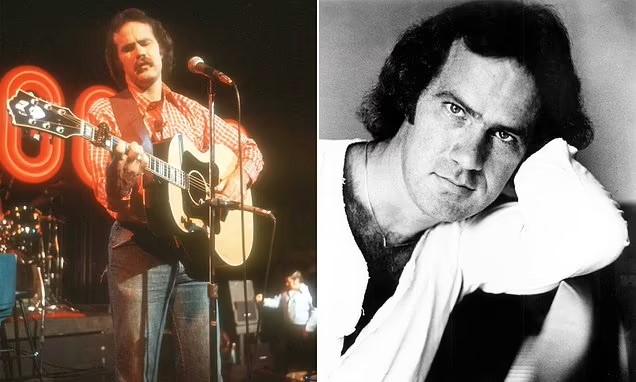“Please Come to Boston” by Dave Loggins is a poignant and evocative song that captures the spirit of longing and the complexities of love. Released in 1974, this song stands as a significant milestone in Loggins’ career, showcasing his talent for storytelling and emotional expression through music. Upon its release, the song quickly climbed the charts, reaching number 5 on the Billboard Hot 100 and securing its place as one of the standout tracks of the 1970s.

The narrative of “Please Come to Boston” is both simple and deeply moving. It tells the story of a man who travels from city to city, pursuing his dreams while longing for his love to join him. Each verse highlights a different city—Boston, Denver, and Los Angeles—where he hopes to settle and build a life with his partner. Despite his earnest pleas, the response from his love remains the same: a refusal to leave their home, coupled with a heartfelt request for him to return.
The song’s opening lines, “Please come to Boston for the springtime / I’m stayin’ here with some friends and they’ve got lots of room”, immediately set the tone for the rest of the piece. The imagery of each city, combined with Loggins’ rich and expressive vocals, paints a vivid picture of a wandering soul in search of companionship and stability. The recurring chorus, “Hey, ramblin’ boy, why don’t you settle down? / Boston ain’t your kind of town”, serves as a poignant reminder of the tension between the protagonist’s dreams and the reality of his relationship.
Musically, “Please Come to Boston” is characterized by its gentle acoustic guitar and subtle instrumentation, allowing the focus to remain on the lyrics and Loggins’ emotive delivery. The arrangement is understated yet effective, creating an intimate atmosphere that draws listeners into the story. Loggins’ voice, with its warm and soulful quality, conveys a sense of vulnerability and earnestness that resonates deeply with the audience.
The song’s success on the charts was a testament to its universal appeal and emotional depth. It not only resonated with those who had experienced similar feelings of longing and love but also appealed to a broader audience with its relatable themes and beautiful melody. The song’s popularity led to numerous covers by various artists, further cementing its status as a classic.
Beyond its commercial success, “Please Come to Boston” has left a lasting impact on the landscape of American music. It exemplifies the singer-songwriter tradition of the 1970s, where personal and introspective lyrics were paired with simple yet powerful melodies. The song’s introspective nature and heartfelt storytelling have influenced countless artists and continue to inspire new generations of musicians and songwriters.
For Dave Loggins, “Please Come to Boston” was a defining moment in his career. It showcased his ability to craft songs that are both deeply personal and universally relatable. The success of the song brought him widespread recognition and established him as a prominent figure in the music industry. Loggins’ songwriting prowess and emotive vocal delivery set him apart as a unique and compelling artist.
In addition to its musical significance, “Please Come to Boston” has also been featured in various media, including television shows and films, further cementing its place in popular culture. Its timeless appeal ensures that it remains a beloved classic, continuing to resonate with audiences decades after its initial release.
In conclusion, “Please Come to Boston” by Dave Loggins is a masterful blend of storytelling and musical artistry. Its heartfelt lyrics, evocative imagery, and soulful delivery make it a standout track in Loggins’ discography and a cherished piece of American music history. The song’s enduring popularity and emotional resonance are a testament to its universal themes and the profound impact it has had on listeners around the world.
🎵 Let’s sing along with the lyrics! 🎤
Please, come to Boston for the Springtime
I’m stayin’ here with some friends, and they’ve got lots of room
And you can sell your paintings on the side-walk
By a café where I hope to be workin’ soon
Please, come to Boston
She said, “No, would you come home to me?”
And she say, hey ramblin’ boy, now won’t you settle down?
Boston ain’t your kinda town
There ain’t no gold and there ain’t nobody like me
I’m the number one fan of the man from Tennessee
Please, come to Denver with the snowfall
We’ll move up into the mountains so far that we can’t be found
And throw “I love you” echoes down the canyon
And then, lie awake at night ’til they come back around
Please, come to Denver
She said, “No, boy, would you come home to me?”
And she said, “Hey ramblin’ boy, why don’t you settle down?
Denver ain’t your kinda town
There ain’t no gold and there ain’t nobody like me
‘Cause I’m the number one fan of the man from Tennessee”
Now, this drifter’s world goes ’round and ’round
And I doubt that it’s ever gonna stop
But of all the dreams I’ve lost or found
And all that I ain’t got
I still need to lean to
Somebody I can sing to
Please, come to LA to live forever
And California’s life alone is just too hard to build
I live in a house that looks out over the ocean
And there’s some stars that fell from the sky
And livin’ up on the hill
Please, come to LA
She just said, “No, boy, won’t you come home to me?”
And she said, “Hey ramblin’ boy, why don’t you settle down?
LA can’t be your kinda town
There ain’t no gold and there ain’t nobody like me
No, no, I’m the number one fan of the man from Tennessee”
I’m the number one fan of the man from Tennessee